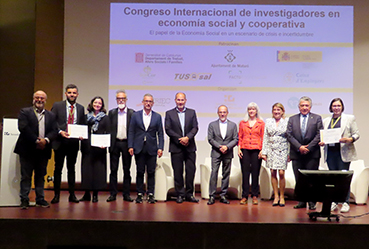Sustainability in its triple aspect, as well as the Sustainable Development Goals (SDGs) have returned to the forefront of the debate among social economy researchers. Alongside this, the historic moment that the social economy is experiencing at global, European and Spanish level stands out with the approval of the UN resolution that promotes it; the implementation of the European Social Economy Action Plan, and the approval in Spain of the draft Comprehensive Social Economy Law, as well as the 2023-2027 Strategy.
This was made clear in the different sessions of the 19th International Congress of Social Economy Researchers of CIRIEC-Spain, which was held from 19 to 21 April at the Tecnocampus Mataró-Maresme, with the collaboration of the Tecnocampus Chair of Social Economy and the Roca i Galès Foundation. It was attended by 130 researchers and managers of the social economy from Spain and 8 other countries, who presented their papers and communications in 9 plenary sessions and 20 parallel thematic workshops.
The first day of the Congress included a videoconference by the Minister of Universities of the Spanish Government, Joan Subirats, who recalled the possibilities offered to the social economy by the recently approved Organic Law of the University System (LOSU), whose articles recognise for the first time the Social Economy as a formula for entrepreneurship that should be promoted by universities, and as a sector that collaborates with the university for research activity and knowledge transfer.
Among the novelties, the Congress included the presentation of the new CIRIEC-Spain Directory of Researchers in Social Economy, and the 2nd Report on University Training in Social Economy, by Millán Díaz Foncea, professor at the University of Zaragoza, director of the ENUIES Network and coordinator of both publications, both of which are already available on the CIRIEC-Spain website.
As he explained, the 2023 Report on University Training in the Social Economy is the first document that brings together all the information available on the training resources taught in Spanish universities, both public and private, in the Social Economy and related fields (social enterprise, social entrepreneurship, social impact, social innovation, etc.).
According to its main conclusions, in total there are 23,000 hours of specific formal training in Social Economy, through 111 training resources, with presence in almost all Spanish regions.
For its part, the new ‘Directory of Researchers and Research Institutions in the Social Economy’ is the fifth to be carried out by CIRIEC-Spain. In addition, it is available in an extended versión on the CIRIEC website since 2020.. The new Directory locates 700 researchers, 200 more than those listed in the previous directory, produced just three years ago.
The Momentum of Social Economy Research
The speakers highlighted the excellent momentum of Social Economy research in Spain, with more and more universities approaching the social economy as a field of study, from very different perspectives and topics but all of them highly topical and of great interest, and with the presence of a relevant entity with a long history that unites them all, such as CIRIEC and its own networks ENUIES and REJIES.
They welcomed the growing international academic recognition of Spanish social economy scientific journals, including ‘CIRIEC-España, Revista de Economía Pública, Social y Cooperativa’; ‘CIRIEC-España, Revista Jurídica de Economía Social y Cooperativa’, and ‘REVESCO, Revista de Estudios Cooperativos’. And they also regretted that although progress in recent decades has been notable, the social economy is still not present or is present in a very isolated way in many universities, both in the field of research and teaching, despite the quantitative and qualitative relevance of the sector and its trajectory.
A critical globalisation
The closing conference was given by Carles Manera, professor at the University of the Balearic Islands, advisor to the Bank of Spain and member of Economists against the Crisis, who was introduced by Maite Cancelo, director of CECOOP, University of Santiago de Compostela and member of the CIRIEC Spain Board of Directors.
Professor Manera recalled the crucial challenges of a “critical globalisation”, the doubts it generates about the type of growth and production, and the metrics that evaluate them.
Awards and closing of the congress
The congress featured the presentation of awards the best doctoral theses defended in recent years, and for the best papers presented at the Congress by young researchers. This session was presented by Professor Elena Meliá, from CEGEA-Universitat Politècnica de València, and José Luis Monzón, honorary professor at the University of Valencia and director of CIRIEC-Spain.
The Scientific Committee of the 19th Congress decided to award Jorge Luis Sánchez Navarro (Polytechnic University of Cartagena) the prize for the Best Thesis in Social Economy, and Francisco José Rincón Roldán (Pablo de Olavide University) and Ana Olveira Blanco (University of Santiago de Compostela) the second prize exaequo. Likewise, Francisco José Rincón received the prize for the best paper presented by young researchers, and Ana Montiel Vargas and Daniel Hernández Cáceres, the second prize, also shared in this category.
The closing ceremony of the XIX Congress was attended by Carles Campuzano, Minister of Social Rights of the Generalitat de Catalunya; Josep Lluís Checa, Director of the TecnoCampus, and Carmen Marcuello, Vice-President of CIRIEC-Spain.
The CIRIEC Congress in Mataró was held in collaboration with the ENUIES Network of University Institutes and Research Centres in Social Economy and the Roca Galès Foundation, and with the sponsorship of the Mataró City Council, the Generalitat de Catalunya, the Ministry of Labour and Social Economy, Caixa d’Enginyers, Tusgsal, Facto Assessors and BonCor, social and sustainable catering.







